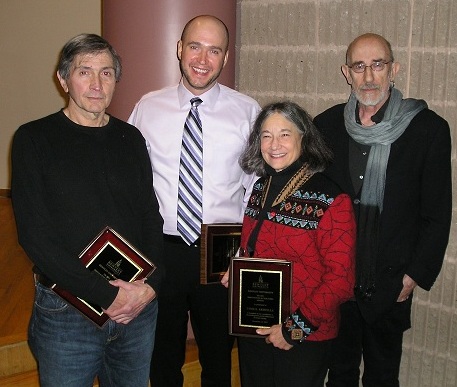
Bentley University Faculty Earn 2011 Innovation in Teaching Awards
Four Bentley University professors received the university’s 2011 Innovation in Teaching awards: Lynn Arenella, Mike Frank, James Pepe, and David Szymanski.
“Each year, four individual faculty members are recognized for their innovation in the classrooms, ,” says Bentley Provost Mike Page “These highly-competitive awards reinforce the teaching mission of the university and reflect not only the high quality of the pedagogical product delivered in Bentley classrooms, but also the dedication that Bentley faculty have for their students.” Recipients receive a certificate and a $2,000 stipend.
Following is a brief description of winners and their courses:
Lynn Arenella, Associate Professor of Biotechnology, Natural and Applied Sciences Department
In NASE 316 Biology of Mind, Professor Arenella used a unique approach to create a new interdisciplinary course that examines the latest discoveries on the biological bases of behavior. Using video cases and unusual medical case histories and stories, students focused on the discussion and analysis of complex questions: What is consciousness? Are animals conscious? What is the relationship between music, memory and language? Why have functional MRI studies helped to create new fields from neuromarketing to neurofinance? Students also read one book from a list of books authored by people suffering from various mental illnesses or conditions. They then provided web-based resource materials for their fellow students, and also made a movie based on some aspect of their book that they really “connected with,” either personally or via the in-class course discussions.
Mike Frank, Associate Professor of Media and Culture
Professor Frank developed an interdisciplinary Undergraduate Fellows Seminar that emphasizes close reading of challenging texts as a means for understanding and making connections among complex ideas. He continues to oversee the program, which is led each year by four different faculty members. The faculty and students meet once a week for three hours to discuss seminal works on a theme of intellectual, social, or moral significance. Topics considered so far include: representation, human nature, and the good life. Since the faculty members come from four different departments, the format helps the students ‘decompartmentalize’ academic knowledge while appreciating the complexity of these issues. Seeing the transdisciplinary linkages, students begin to appreciate the difference between being informed and being educated. Professor Frank acknowledges the crucial support of Chris Beneke, director of the Valente Center for Arts and Sciences at Bentley, in sustaining this program which is aimed at the Bentley goal of liberally educated business professionals.
James Pepe, Senior Lecturer in Computer Information Systems
Within the last there years, Android has evolved from being a Smartphone to an actual computer platform on which new applications may be developed, marketed, and distributed over the web. Businesses are now exploring ways in which mobile computing can be used to offer solutions and services. As Google and other corporate partners advance the capabilities, interested parties must work hard to stay current. In CS402: Android Application Development, Pepe focuses on creating Android applications, with a goal for students to create sophisticated applications by the end of the course. This hands-on experience, using ‘bleeding-edge’ technology complemented by CS460 (Project Management), gives Bentley graduates an advantage in a competitive technology market.
David Szymanski, Assistant Professor of Natural and Applied Sciences
Professor Szymanski used an innovative approach to leverage curricular learning with civic engagement. As part of a fourth-credit service-learning option in NASE402: Federal Environmental and Natural Resource Policy, he took students to Washington, D.C. after conducting a research project for the Environmental and Energy Study Institute (EESI), a D.C.-based nonprofit. The project consisted of students developing an interview questionnaire for small-business owners across various sectors in order to assess how small businesses plan for future energy use and price fluctuations. While in D.C., the students talked with staffers from the offices of Senator John Kerry (MA), Senator Jeanne Shaheen (NH), Senator Scott Brown (MA) and the Senate Energy and Natural Resources Committee, as well as Senator Jon Tester (MT) himself. Ultimately, the four senators sent letters to both the EPA and the SBA urging their participation in what they called a “win-win” situation to help make small business owners aware of federal programs incentivizing energy efficiency.
Pictured above: James Pepe, David Szymanski, Lynn Arenella, and Mike Frank.

